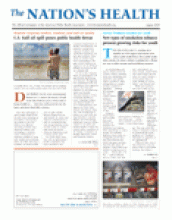On any given night, more than 643,000 people are without homes in the United States. Sometimes among the homeless is a single mother. Other times, it is a veteran suffering from post-traumatic stress disorder. To confront the problem, the U.S. Interagency Council on Homelessness in June launched its national plan to end homelessness.
Released at a White House news conference, the federal strategic plan to prevent and end homelessness is officially known as “Opening Doors.” The plan is a culmination of decades of work and focuses on affordable housing as the most important tool to end homelessness. Neil Donovan, executive director of the National Coalition for the Homeless, also noted that many health care advocates believe “housing is health care.” He added that there is often a connection between a person’s housing situation and her or his access to quality health care.
“Housing status would improve health status,” Donovan told The Nation’s Health.
The national plan has four main goals: to end chronic homelessness in five years; prevent and end homelessness among veterans in five years; prevent and end homelessness for families, youth and children in the next 10 years; and set a path to ending all types of homelessness. The plan also includes 10 objectives and 52 strategies to help accomplish the four goals.
“The goals and timeframes we aspire to in this plan are an important target for the nation,” stated the plan. “They demonstrate the council’s belief that ending homelessness in America must be a priority for our country.”
Contrary to popular stereotypes, homelessness affects people from a variety of demographics, even those who typically have access to support services, such as veterans. Donovan noted many homeless veterans hail from an older generation of soldiers.
U.S. Veterans Affairs Secretary Eric Shinseki said at the news conference that today there are more than 100,000 homeless veterans, and they are often the most difficult to serve. Many suffer from post-traumatic stress disorder, traumatic brain injury and sexual trauma, according to data presented in the plan. Such factors can interfere with forming stable relationships and finding employment upon a veteran’s return home. Recognizing that many veterans have slipped through the cracks, officials with the U.S. Department of Housing and Urban Development and VA have allotted $15 million for a prevention project targeting at-risk veterans, according to the plan.
At the news conference, HUD Secretary Shaun Donovan and members of the interagency council said homelessness not only demands federal attention, but that the success of the Opening Doors plan depends on the commitment of a variety of sectors. In fact, state and local public health workers should “consider themselves an active stakeholder in the community’s efforts to help end homelessness,” Neil Donovan said.
“(Public health workers should) represent the issue of homelessness as a health issue,” he said, noting that the public health community is critical to education efforts as well as in getting residents involved in efforts to prevent and end homelessness.
For a copy of the plan, visit www.usich.gov/PDF/OpeningDoors_2010_FSPPreventEndHomeless.pdf.
- Copyright The Nation’s Health, American Public Health Association









